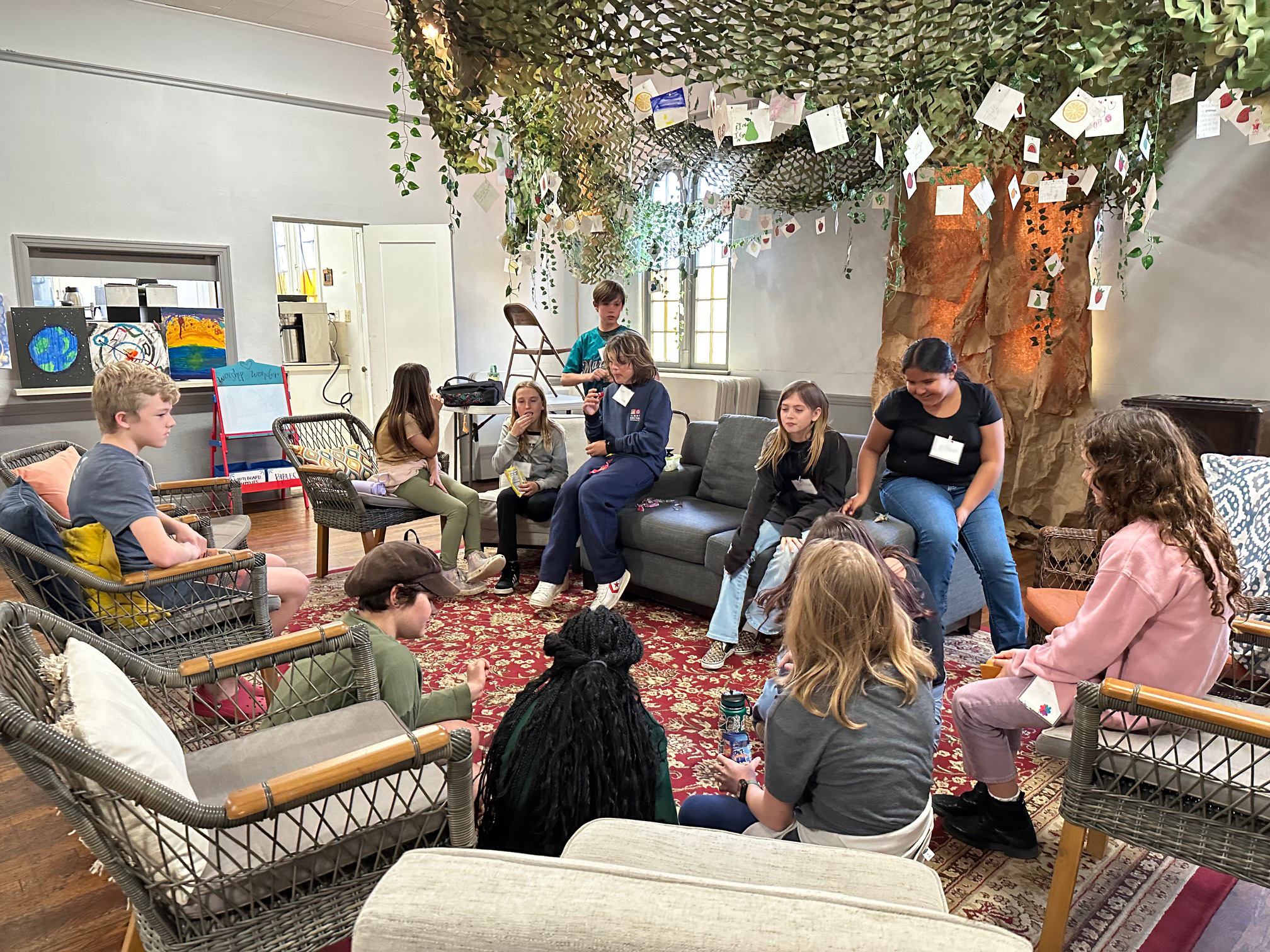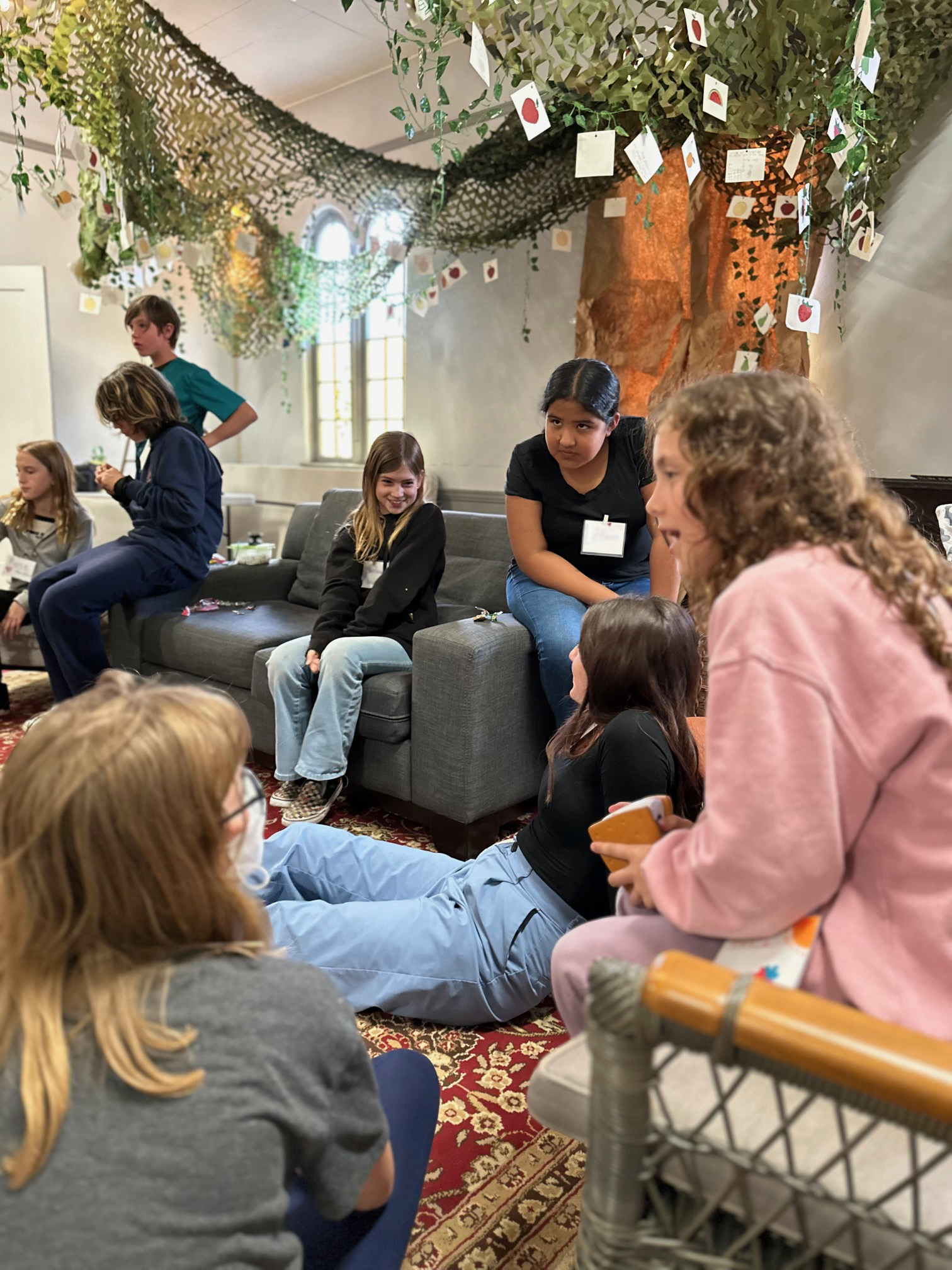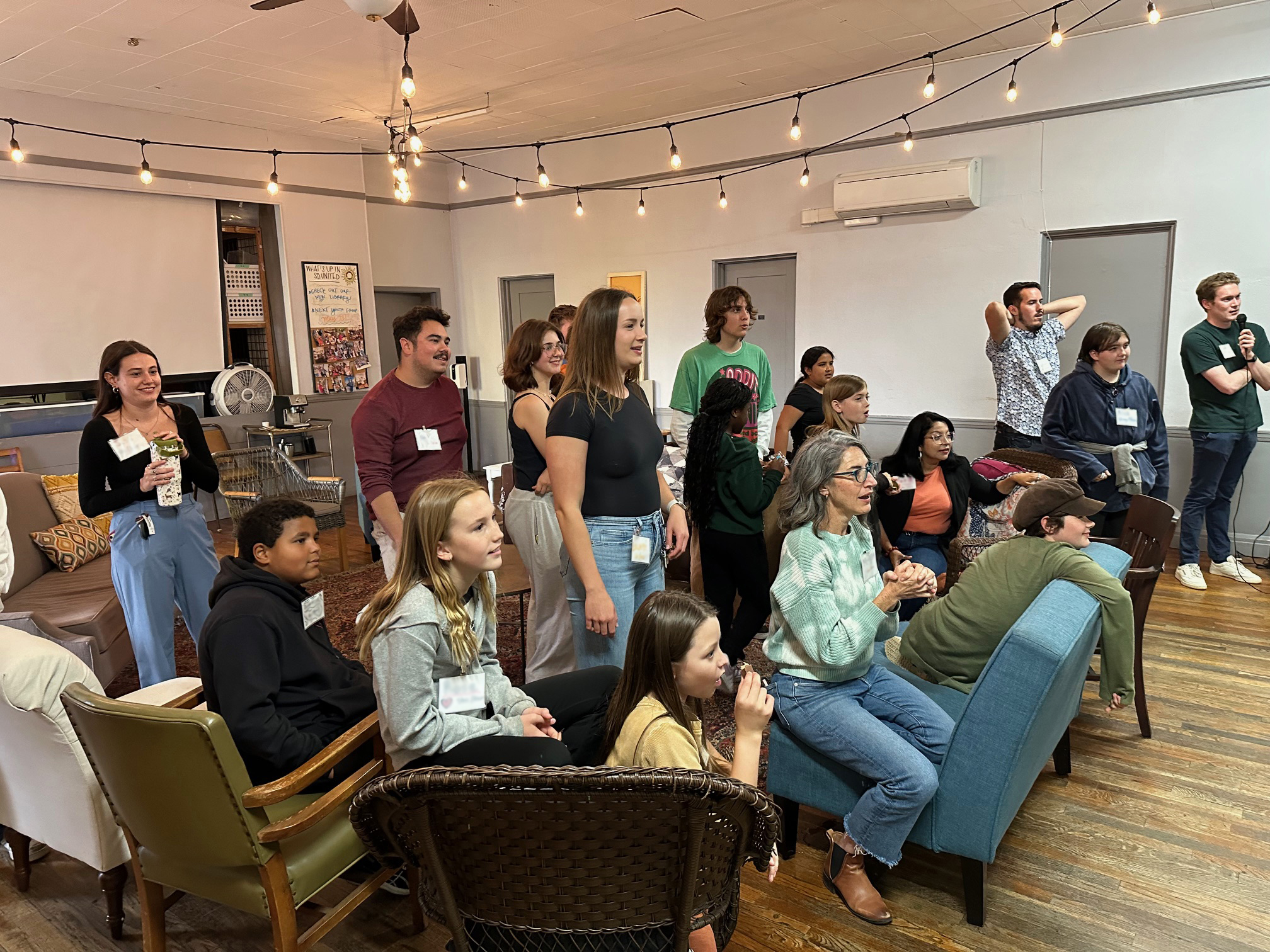
What’s Working: SD United
This post continues our series to showcase our learnings in a multi-year campaign titled What’s Working, a Lilly Endowment Inc.– supported project to discover how faith-based organizations are working to engage Gen Z. Over the course of 2024, we’ll visit organizations across the country that are revamping traditional methods and innovating new ways to connect with and support the flourishing of young people. Here, we showcase, SD United, a San Diego-based youth ministry for 6-12th graders that offers an inclusive space to learn and grow in community.
On a Thursday night at Normal Heights United Methodist Church, the sound of spirited debate among 20 teenagers filled the historic sanctuary. The subject of the evening: a game of This or That, where each group was given one of two options (popsicle or ice cream) and the group’s representatives had to argue in favor of their option. The students intensely argued whether popsicles or ice cream were better, and a fair amount of heckling arose from the opposing sides. In the end, ice cream won out, much to the groaning disappointment of the popsicle fans.

It was hardly your traditional weeknight youth group. And that was the point.
Melissa Tucker, a youth minister at Normal Heights United Methodist Church, and Marshela Salgado-Solorio, a youth minister at University Christian Church, came together to create a different vision for youth engagement that created a space where any young person—white or black, straight or gay, cis or trans, neurotypical or neurodivergent, churchgoer or nonreligious—could grow their faith in community. What emerged was SD United, a collaborative model of youth ministry supporting 6th –12th graders.
“We [talk] about our purposes for this youth group as a braid,” Melissa said. “And so there would be these three things that we would constantly be weaving in and wanting to balance. And so the first one was inclusivity and making sure that we’re accommodating and we’re accessible. The second part was this love for justice and faithfulness and the ethic of Jesus; so much of Jesus’ life, ministry, and message were about justice, love, and compassion. And then the third one was fun. Still to this day, just the weaving of those three, inclusivity, justice in the way of Jesus and fun. And that really does kind of help us navigate what we choose to incorporate.”
The two leaders agreed that the group should be rooted in intentional inclusivity. For Marshela, this meant creating the youth group she didn’t have growing up—one where no one is on the fringes.
“If you look at our core values…we started from a place of first ‘God made you beautiful, period.’ There are no, ‘but you need to change this’—just ‘God made you beautiful,’” Marshela said. “That’s where we want to start. What that means for us too is being very vocal on our website and talking to people, and even with the students, about being inclusive. And what does inclusivity mean? [It] means that regardless of any part of your identity, including if you have mental health issues, if you identify as part of the LGBTQ+ community, regardless of your race, all those beautiful things, regardless of all that, you’re welcome here.”

The first time SD United participant Liv stepped into the space, they instantly knew this was the spot for them.
“I remember specifically that [for] the lesson that night they did a panel, so it was four of the youth leaders, and they were asking them questions,” Liv said. “I don’t really remember what the topic was, but I do remember that one of the youth leaders mentioned being a queer man of color, and that really resonated with me…being so open about being queer in a holy space, which I had never seen before growing up Methodist…finding that community of people that believes the same things that I believe while simultaneously loving God and accepting God; it was very eye-opening to me. It kind of allowed me to come out of my shell and accept myself and God’s love for me.”
The sense of welcoming and inclusion that Liv felt is deliberate—and baked into every element of the experience. Melissa and Marshela recruited young adult leaders to help create and deliver the youth group’s offerings. Together they realized they had yet to find a curriculum rooted in progressive theology that also captured their aim for expanded inclusivity. So when they couldn’t find one to support all their needs, they wrote their own.

They also applied this same approach to programming. After asking young people what they wanted to see in a youth group night, Melissa and Marshela quickly realized that no one expected a traditional format, and so they were free to fashion something that worked for their young people. They landed on teaching and small groups sandwiched between structured social time.
“What we found was kind of giving a generous time at the beginning to connect—that social buffer at the beginning, at the end, and making our small groups end when they want to,” Melissa said. “If the conversation’s rich, keep going. If it’s not, be done when you’re done. [At the end] there’s going to be snacks and stuff available. And the amount of time that we’ve put into things, I just feel that each component matters. We chose it because it matters. It is the right length, and it just flows.”
One of the young adult leaders inspired the coining of SD’s adopted tagline “Your story, your space. Our story, our space,” which reflects the group’s commitment to young people living a faith journey that includes both individual and communal elements. And it resonates with the young people SD United serves.
“It’s cool to hear them just champion the youth group and just say like, ’Yeah, I love it. It’s one of my favorite spaces,’” Marshela said. “And then hearing parents share, ‘so-and-so really wants to go to youth group, a safe space. It’s one of their only safe spaces.’ Even seeing posts on Instagram— that’s where I get all emotional because sometimes they’ll get really mushy about youth group. It’s not just me making up the story about this being a safe space, but actually hearing it from the teens…it’s real.”
Youth Group as a Healing Space for Young Adults
SD United leaders Melissa Tucker and Marshela Salgado-Solorio recruited young adult leaders ages 18 and up to help them create curriculum and help lead youth group nights. Both Melissa and Marshela have enjoyed getting to know the young adults’ stories and watching their contributions make SD United even more relevant and meaningful for young people. Yet, Melissa and Marshela noticed something else happening: in helping to shape a group for young people they were healing a part of their own teenage story.
Melissa said: “[We offered] a lesson on inherent belovedness — that you as part of creation are not just created good, but created supremely good… And it was a ministry student at a college in town that was teaching the lesson and she was naming that’s not just that your soul is good, but that your body’s good and therefore your desires are good and your creative sparks are good. At the debrief after that, one of the young adult leaders was crying, saying ‘never in church have I ever heard that my desires are good. Rather I’ve heard often my flesh is weak or corrupt or my desires are suspect.’ You could see that this was healing for them too. And often I’ll notice when I’m teaching, my young adult leaders are leaning forward and they’re nodding their heads and they’re tracking. It feels like reparative in a way. We have an application process that you fill out when you want to be a leader. One of the questions is, why this opportunity? Why right now? And without a doubt, nearly everybody says, I’m ready to build the youth group that I wish that I had had. It is acknowledging that youth group spaces were some of the most important spaces and also some of the most harmful. And holding those together is a tough thing to carry…I think just the opportunity for young adults to do that healing work and then also generate what feels right and appropriate and needed for our teens is super, super special.”
This site visit was made possible through a grant from Lilly Foundation, Inc. Watch for future blogs recapping our site visits that show What’s Working.



